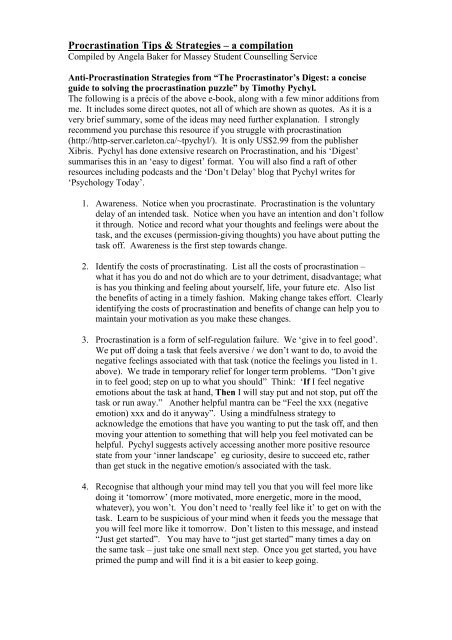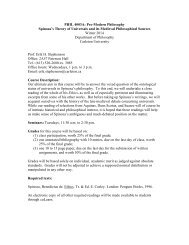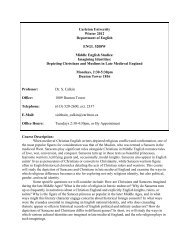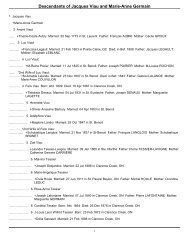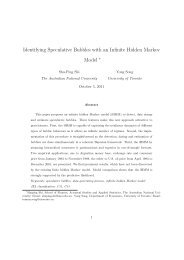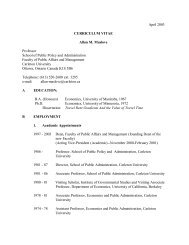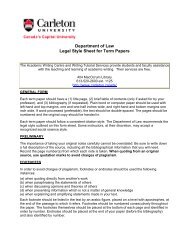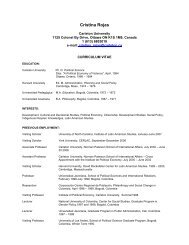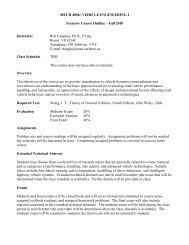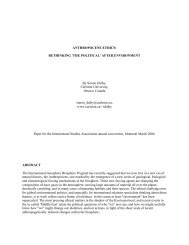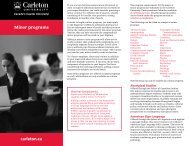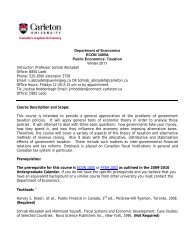20 Tips to Reduce Academic Procrastination
20 Tips to Reduce Academic Procrastination
20 Tips to Reduce Academic Procrastination
You also want an ePaper? Increase the reach of your titles
YUMPU automatically turns print PDFs into web optimized ePapers that Google loves.
<strong>Procrastination</strong> <strong>Tips</strong> & Strategies – a compilationCompiled by Angela Baker for Massey Student Counselling ServiceAnti-<strong>Procrastination</strong> Strategies from “The Procrastina<strong>to</strong>r’s Digest: a conciseguide <strong>to</strong> solving the procrastination puzzle” by Timothy Pychyl.The following is a précis of the above e-book, along with a few minor additions fromme. It includes some direct quotes, not all of which are shown as quotes. As it is avery brief summary, some of the ideas may need further explanation. I stronglyrecommend you purchase this resource if you struggle with procrastination(http://http-server.carle<strong>to</strong>n.ca/~tpychyl/). It is only US$2.99 from the publisherXibris. Pychyl has done extensive research on <strong>Procrastination</strong>, and his ‘Digest’summarises this in an ‘easy <strong>to</strong> digest’ format. You will also find a raft of otherresources including podcasts and the ‘Don’t Delay’ blog that Pychyl writes for‘Psychology Today’.1. Awareness. Notice when you procrastinate. <strong>Procrastination</strong> is the voluntarydelay of an intended task. Notice when you have an intention and don’t followit through. Notice and record what your thoughts and feelings were about thetask, and the excuses (permission-giving thoughts) you have about putting thetask off. Awareness is the first step <strong>to</strong>wards change.2. Identify the costs of procrastinating. List all the costs of procrastination –what it has you do and not do which are <strong>to</strong> your detriment, disadvantage; whatis has you thinking and feeling about yourself, life, your future etc. Also listthe benefits of acting in a timely fashion. Making change takes effort. Clearlyidentifying the costs of procrastination and benefits of change can help you <strong>to</strong>maintain your motivation as you make these changes.3. <strong>Procrastination</strong> is a form of self-regulation failure. We ‘give in <strong>to</strong> feel good’.We put off doing a task that feels aversive / we don’t want <strong>to</strong> do, <strong>to</strong> avoid thenegative feelings associated with that task (notice the feelings you listed in 1.above). We trade in temporary relief for longer term problems. “Don’t givein <strong>to</strong> feel good; step on up <strong>to</strong> what you should” Think: ‘If I feel negativeemotions about the task at hand, Then I will stay put and not s<strong>to</strong>p, put off thetask or run away.” Another helpful mantra can be “Feel the xxx (negativeemotion) xxx and do it anyway”. Using a mindfulness strategy <strong>to</strong>acknowledge the emotions that have you wanting <strong>to</strong> put the task off, and thenmoving your attention <strong>to</strong> something that will help you feel motivated can behelpful. Pychyl suggests actively accessing another more positive resourcestate from your ‘inner landscape’ eg curiosity, desire <strong>to</strong> succeed etc, ratherthan get stuck in the negative emotion/s associated with the task.4. Recognise that although your mind may tell you that you will feel more likedoing it ‘<strong>to</strong>morrow’ (more motivated, more energetic, more in the mood,whatever), you won’t. You don’t need <strong>to</strong> ‘really feel like it’ <strong>to</strong> get on with thetask. Learn <strong>to</strong> be suspicious of your mind when it feeds you the message thatyou will feel more like it <strong>to</strong>morrow. Don’t listen <strong>to</strong> this message, and instead“Just get started”. You may have <strong>to</strong> “just get started” many times a day onthe same task – just take one small next step. Once you get started, you haveprimed the pump and will find it is a bit easier <strong>to</strong> keep going.
5. Generally speaking people who say they ‘work best under pressure’ mean thatthe only time they can overcome procrastination is under pressure. This doesnot necessarily mean they “work better under pressure”. (See no. 7 below).Be aware that although people often believe this is because they are ‘adrenalinjunkies’ or ‘thrill seekers’, research shows that this is a myth for the majorityof people who procrastinate.6. Beware the ‘feel good’ of ‘good intentions’. If you give in <strong>to</strong> procrastinationby saying <strong>to</strong> yourself ‘I’ll do it <strong>to</strong>morrow’, you will experience the immediaterelief of not having <strong>to</strong> do the task now, plus the positive feelings that go withcreating positive goals – we imagine ourselves in<strong>to</strong> <strong>to</strong>morrow feeling great andgetting on with the task effortlessly (when we are doing this kind of thinking,the picture of the future is generally ungrounded, undetailed, not taking in<strong>to</strong>account the nitty gritty realities of the situation, and over-optimisitic).7. Research shows that we tend <strong>to</strong> over-estimate the difficulty andunpleasantness of tasks. Research also shows that getting started on a taskchanges our perception of it, and can also change our perception of ourselves(we feel more in control, more optimistic). Once we start a task it is rarely asbad as we think. And generally, if we’ve put it off <strong>to</strong> the last minute, once westart it and find it more interesting than we thought, we wish we’d startedearlier so that we could have done a better job of it. So “Just get started”.Progress on our goals makes us feel happier and more satisfied with life andwith ourselves. These positive emotions help us <strong>to</strong> make further progress onour goals – a positive cycle begins. So ‘just getting started’ helps <strong>to</strong> prime thepump <strong>to</strong>wards us feeling more motivated and energised and ‘in the mood’.8. Identify you own set of ‘most commonly used’ excuses and self-deceptions.Make a list of them. Get practiced at spotting them. And form a clear‘implementation intention’ (see no. 9 below) in relation <strong>to</strong> your excuses.9. Make use of well-formed ‘implementation intentions’. An implementationintention is what moves a ‘goal intention’ in<strong>to</strong> action. An effective format foran implementation intention is “if…. Then….’. That is, we get very clearabout what (very specifically) we will do when a particular situation occurs(eg an unhelpful thought, distraction etc). We make a ‘predecision’ about howwe will deal with possible challenges.Eg “If my mind tells me ‘I’ll feel more like doing it <strong>to</strong>morrow’ then I willjust get started on some small aspect of the task anyway (ie ‘just get started).10. Think about your goals in very concrete, specific ways. Thinking abstractlyabout our goals leads us <strong>to</strong> believe that they are not that urgent. The moreconcrete your thoughts and plans, the more easily they will lead <strong>to</strong> timelyaction. Break your tasks down in<strong>to</strong> smaller steps. Make a list of thesubtasks involved in a bigger task, mark order of priority. Do one step at atime.11. Beware! The feel-good feelings when you ‘just get started’ can lull you in<strong>to</strong>more easily giving in <strong>to</strong> distractions. The ‘feel-good’ can make us overlyoptimistic about how much work remains and how quickly we can do it, howmuch we have done compared <strong>to</strong> the task as a whole etc. We can also kidourselves in<strong>to</strong> believing that we need the reward of the distraction, for havinggot started. Arm yourself against this.
12. You need <strong>to</strong> remain vigilant <strong>to</strong> procrastination thoughts and feelings even onceyou have got started. It can be easy <strong>to</strong> avoid the feelings of discomfort thatcome with feeling stuck, finding there is something we don’t understand ordon’t know how <strong>to</strong> do etc by giving in <strong>to</strong> a distraction. “We have <strong>to</strong> beprepared for changes in our mood related <strong>to</strong> setbacks and disappointments.We have <strong>to</strong> be prepared <strong>to</strong> deal with distractions. We have <strong>to</strong> be prepared <strong>to</strong>overcome obstacles. For each potential distraction, obstacle or setback eithera) Identify how you can remove it / shut yourself off from it eg turn of yourphone, shut down your email programme etc before you start work. Or B)Form an implementation intention for the distraction eg “If any friends inviteme out this weekend Then I will immediately say ‘thanks, but no – I’mcommitted <strong>to</strong> finishing my work’”. Research shows that participants whoformed temptation-inhibiting implementation intentions outperformed thegroups who did not – and this effect was independent of the participants’motivation <strong>to</strong> achieve their goal and <strong>to</strong> ignore distractions.13. Will power is a limited resource! The more we have already had <strong>to</strong> exerciseself-regula<strong>to</strong>ry strength, the less well we maintain that strength in a new task.But this effect is eliminated if it is for a task we feel highly motivated <strong>to</strong> do (ieit has a higher level of interest <strong>to</strong> us and so we feel more energised <strong>to</strong> do it).But successful goal pursuit depends on us moving past these momentaryfeelings or perceptions of ‘depletion’. We need <strong>to</strong> be able <strong>to</strong> transcend thefeelings of the moment in order <strong>to</strong> focus on the overall goals and values.What helps us muster or res<strong>to</strong>re our willpower or self-regula<strong>to</strong>ry strength? a)Willpower is like a muscle – the more we exercise it, the stronger it gets. b)Sleep and rest help – are you getting enough sleep? c) Self-regulation is harderlater in the day when we are more tired so be strategic about when you do thetasks that are more difficult for you <strong>to</strong> stick <strong>to</strong>. d) A boost of positive emotionhelps boost willpower. Find things you can do <strong>to</strong> replenish your strength –without being a distraction from your task! e) Use implementation intentions(If…Then) <strong>to</strong> trigger you in<strong>to</strong> action, even when you don’t ‘feel like it’. f)Self-regulation appears <strong>to</strong> depend on available blood glucose. Avoid gettinghypoglycaemic as your self-regulation will suffer. Keep a piece of fruit(complex carbohydrate) handy <strong>to</strong> res<strong>to</strong>re your blood glucose level. g) Beaware that social situations may require more self-regulation effort than youthink. The effort you put in<strong>to</strong> behaving appropriately in social situations candeplete your self-regula<strong>to</strong>ry strength and have you more likely <strong>to</strong> give in <strong>to</strong>something other than your ‘task at hand’. h) Our motivation has a significanteffect on our self-regula<strong>to</strong>ry strength so being clear about our goals and valuesand finding ways <strong>to</strong> keep these very ‘alive’ <strong>to</strong> us can help us not <strong>to</strong> give in <strong>to</strong>‘feel good’ temptations that take us away from our ‘task at hand’.14. If you are an impulsive person, the implementation intention “If an alternativeintention arises such as an invitation <strong>to</strong> go out, Then I will say that I will makemy decision in 10 minutes” can help. Building in a delay can have you avoidimpulsive decisions or actions. It is also important <strong>to</strong> pre-plan re shutting ou<strong>to</strong>r making ‘pre-decisions’ re distractions.
15. If you are a disorganised person, deliberately structuring tasks and sub-taskswill be important. Also de-cluttering your work area may be important – butbeware that you don’t use ‘tidying up’ as yet another form of procrastination.16. If you are a person who is prone <strong>to</strong> worry, self-consciousness, fear of failure,perfectionism etc it is important <strong>to</strong> challenge your worries and beliefs as theyarise – you may want <strong>to</strong> get some help with this from a counsellor, self-helpbook etc.17. If you are a person whose moods fluctuate a lot, and what you do is overlyinfluenced by how you feel, you may want <strong>to</strong> get some help in skills related <strong>to</strong>emotion regulation and distress <strong>to</strong>lerance, either from a counsellor or a selfhelpbook.18. Cyberslacking on the procrastination superhighway (chapter 10). Oneresearch project 10 years ago found that 47% of the time people spend onlineis spent procrastinating – and it may well be more than that now.19. Beware of ‘justs’ – I’ll ‘just’ check my facebook, I’ll just check my emails(and also non-cyber ‘justs’ eg I’ll ‘just’ go <strong>to</strong> the café for a coffee. Beware of‘it’ll only take a minute’.<strong>20</strong>. Beware of the temptations of social networking sites (in terms of losing timewhen you had intended <strong>to</strong> get something else done). We are social beings, sothese sites are rewarding. And the reward is immediate. Rewarding andImmediate. This is a potentially addictive combination. It also provides aready distraction, and this can be a problem for people who are impulsive.21. Beware of the myth of multi-tasking – research indicates that only a verysmall percentage of people can effectively multi-task. So don’t kid yourself!Strategies for dealing with ‘cyber’ distractions are the same as above – shutyourself off from the temptations that you can (close your email programme,turn off your phone). And have an ‘implementation goal’ formulated refeelings of temptation regarding ‘just’ checking your email/facebook/phone eg“If I have the temptation <strong>to</strong>, or thought <strong>to</strong> ‘just check’, Then I will stay put andkeep working on my task at hand.” Do not ‘give in <strong>to</strong> feel good’.22. There are no “quick fixes’. <strong>Procrastination</strong> is a habit that requires hard work<strong>to</strong> break. Ongoing conscious effort and vigilance is required. Be strategic inyour change effort – pick one or two things <strong>to</strong> work on at once rather than try<strong>to</strong> change everything. Accept that it may well involve one step forward andtwo steps back. Be kind but firm with yourself when you have a setback.Research has shown that self-forgiveness in relation <strong>to</strong> procrastination isrelated <strong>to</strong> less procrastination in the future. Forgive yourself and start backin<strong>to</strong> work again. Start, and re-start.
Ideas from Clarry Lay “Some Basic Elements in Counselling Procrastina<strong>to</strong>rs”.From ‘Counseling the procrastina<strong>to</strong>r in academic settings’ edited by Henri C.Schouwenburg et al. Washing<strong>to</strong>n, DC : American Psychological Association, c<strong>20</strong>04General Thesis“Nothing beats the timely pursuit of one’s intentions. It is the measure of successin life.”Orientations Toward Change1. You must spend more time working on the tasks that are most important.2. You must spend less time on less important tasks.3. Once you have formed intentions regarding some task, you have an obligationand responsibility (primarily <strong>to</strong> yourself) <strong>to</strong> act on them.4. The ultimate payoff for change is that you will feel better about yourself.Operations Toward Change1. You must spend more time in the right place/s (a place with fewer distractions;the right place ‘primes’ you <strong>to</strong> work, prompts your intentions etc p.54).2. Form highly detailed intentions regarding each task that specify day, time,place, and for how long.3. Write down the details of your intentions and refer <strong>to</strong> them often on a regularbasis.Reminders1. Your intentions should override how you feel at the moment.2. Procrastina<strong>to</strong>rs tend <strong>to</strong> overestimate the degree of unpleasantness of a task.3. Work on your task at any level, and think of the task at the simplest level whennecessary. Ask yourself “What do I have <strong>to</strong> do for the next hour? I have <strong>to</strong>turn pages and read words on the page” as opposed <strong>to</strong> “I have <strong>to</strong> complete mydegree, get <strong>to</strong>p grades, please my parents, and get a job.” – bring it <strong>to</strong> practical‘up close’ small chunk steps.4. Focus on one task at a time.Other Helpful IdeasBuilding RitualsIn “The Power of Full Engagement” the authors Jim Loehr and Tony Schwartz writeabout establishing ‘rituals’ <strong>to</strong> establish new habits. “But just as negative habits androutines in our lives can be undermining and destructive, so positive ones can beuplifting and revitalising… Building rituals requires defining very precise behavioursand performing them at very specific times – motivated by deeply held values. AsAris<strong>to</strong>tle said: “We are what we repeatedly do.” Or as the Dalai Lama put it morerecently: “There isn’t anything that isn’t made easier through constant familiarity andtraining. Through training we can change; we can transform ourselves.”Urge SurfingIt is important <strong>to</strong> be aware that unhelpful feelings will pass, and that we don’t need <strong>to</strong>give in <strong>to</strong> these feelings by procrastinating. Being more ‘mindful’ of your thoughtsand feelings will be important in the fight against procrastination. Learning theMindfulness technique of ‘Urge Surfing’ is likely <strong>to</strong> be really helpful. See Chapter 15in ‘The Happiness Trap’ by Russ Harris, for more about this.


